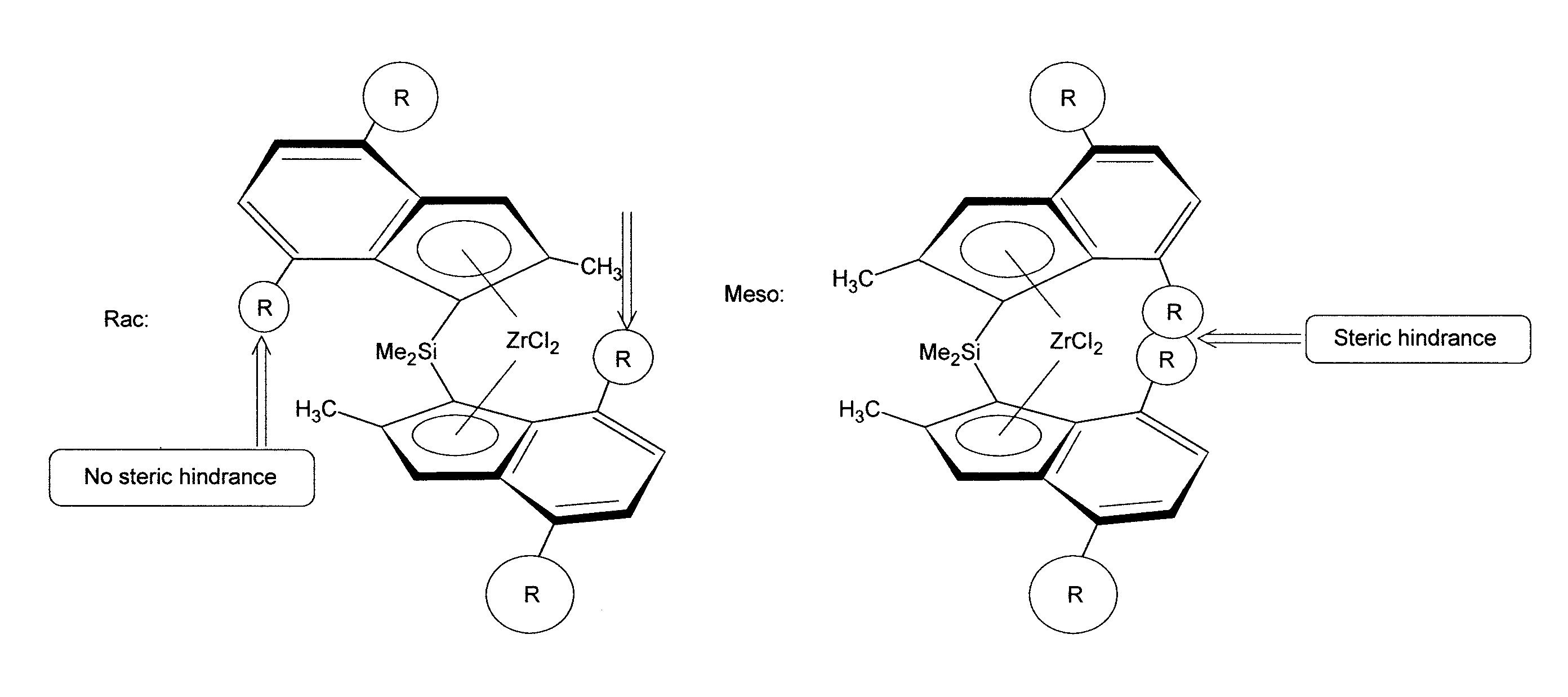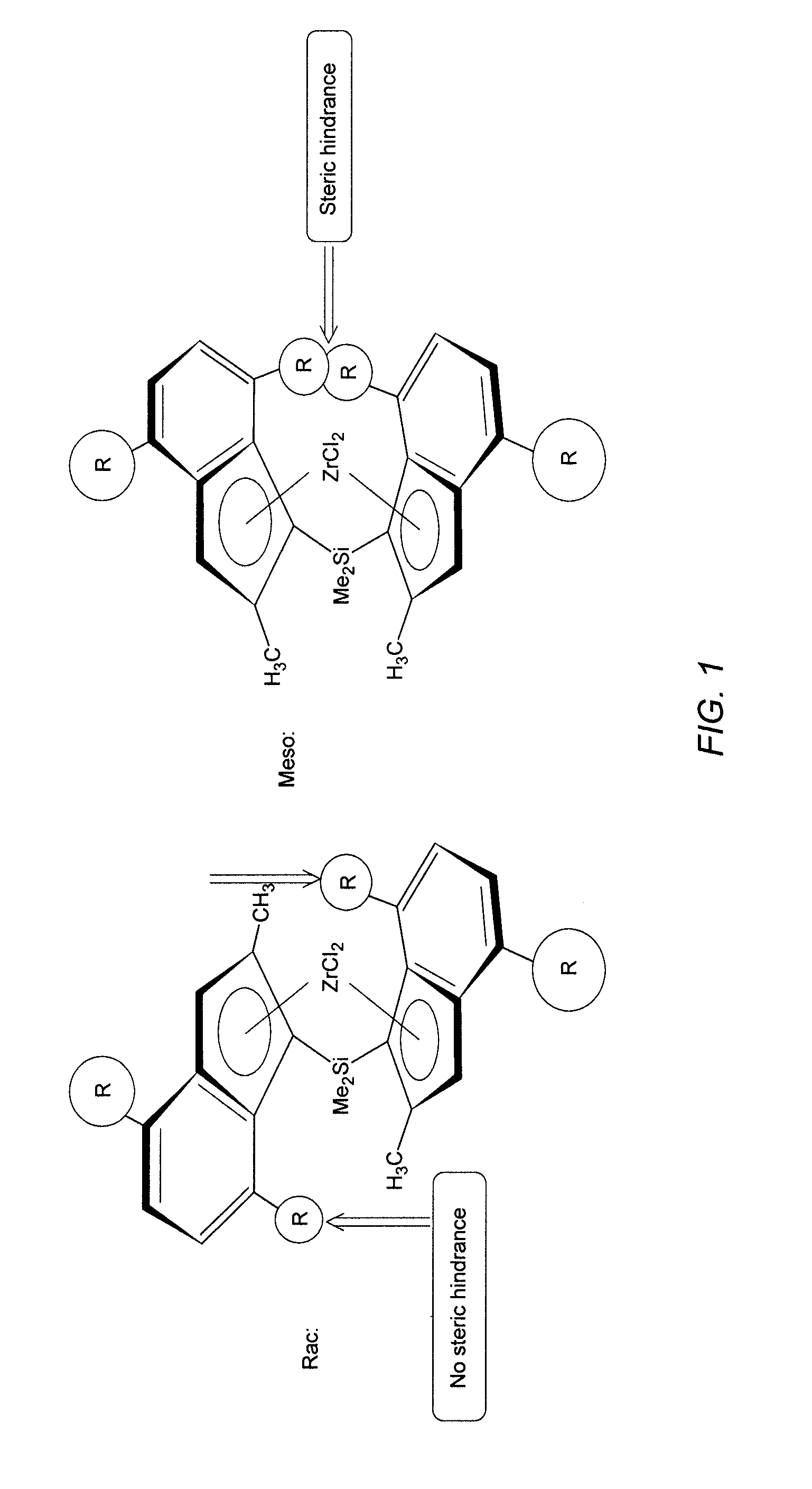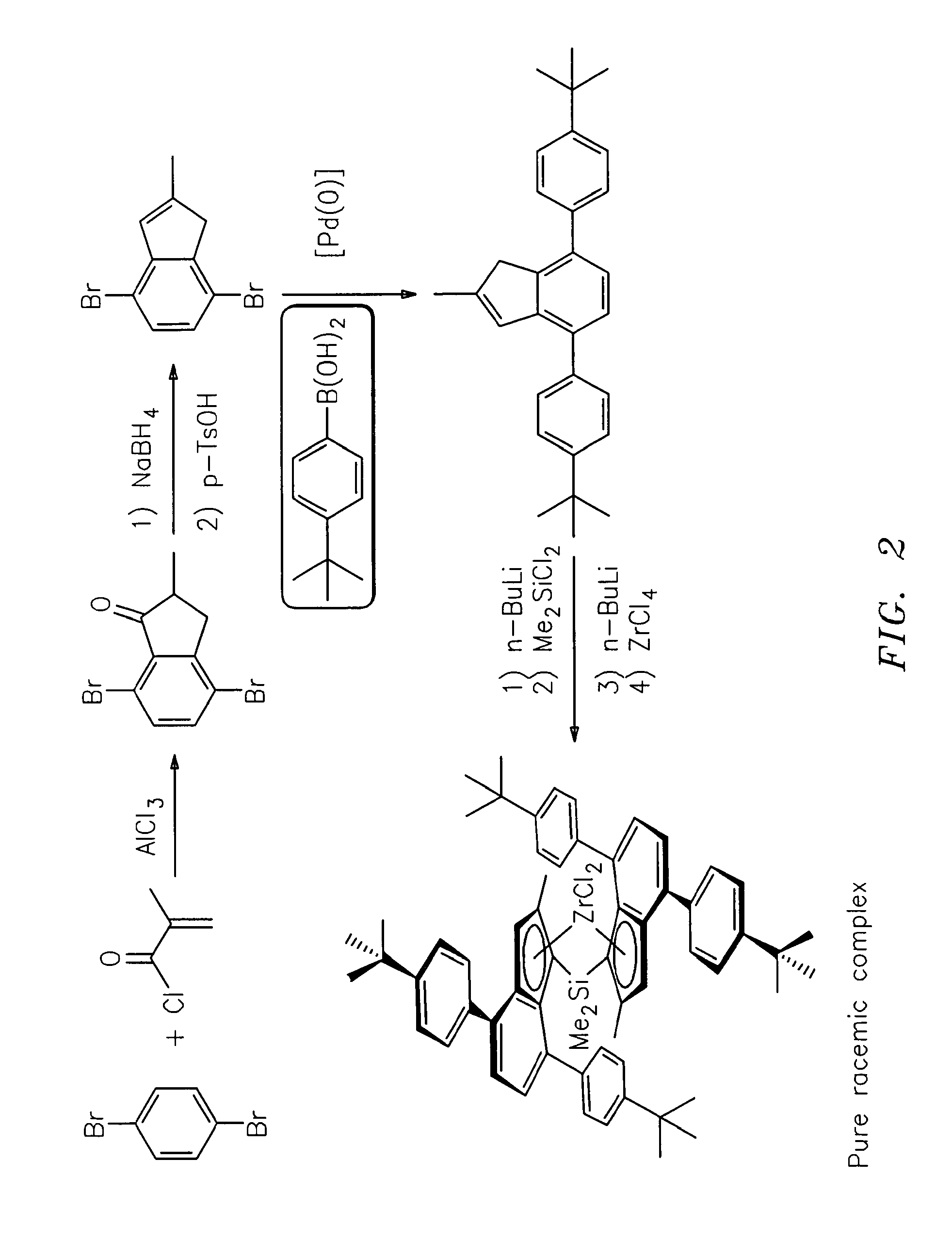Racemoselective synthesis of ansa-metallocene compounds, ansa-metallocene compounds, catalysts comprising them, process for producing an olefin polymer by use of the catalysts, and olefin homo- and copolymers
a technology of ansa-metallocene compounds and racemoselective synthesis, which is applied in the direction of catalyst activation/preparation, metalocenes, organic compounds/hydrides/coordination complexes catalysts, etc., can solve the problem of low yield of possible pure racemic complexes and large amount of solvents for final separation, and achieve superior olefin polymerisation results
- Summary
- Abstract
- Description
- Claims
- Application Information
AI Technical Summary
Benefits of technology
Problems solved by technology
Method used
Image
Examples
example 1
Dimethylsilanediylbis(2-methyl-4,7-bis-(4-t-butyl-phenyl)-indenyl)zirconium dichloride
4,7-Dibromo-2-methyl-indan-1-one
[0397]
[0398]94.37 g (0.40 mol) 1,4-Dibromobenzene and 106.7 g (0.80 mol) anhydrous aluminum trichloride were placed in a 1000 ml round bottom flask equipped with a mechanical stirrer. 62.72 g (0.60 mol) 2-Methyl-acryloyl chloride were added under heat evolution (50-55° C.). The mixture was heated, starting at 105° C. a strong gas evolution was observed and the temperature rose to 135° C. Heating of the now solid mass was continued for 3 h at 110° C. After cooling to room temperature 200 g ice was added very carefully, followed by the careful addition of 200 ml cone. HCl. The mixture was extracted three times with 250 ml dichloromethane each. The combined organic layers were washed with 250 ml water and 250 ml of a saturated sodium bicarbonate solution, dried over magnesium sulfate, and the solvent was removed in vacuo. Flash chromatography using silica and heptane / di...
example 2
Dimethylsilanediylbis(2-methyl-4,7-bis-(1-naphthyl)-indenyl)zirconium dichloride
4,7-Bis-(1-naphthyl)-2-methyl-1H-indene
[0407]
[0408]In a 500 ml roundbottom flask were placed 17.6 g (61.1 mmol) 4,7-Dibromo-2-methyl-1H-indene, 26.3 g (2.5 eq.) 1-napthyl boronic acid, 274 mg (2 mol %) palladium acetate, 42.23 g (2.5 eq.) potassium carbonate, 39.4 g (2 eq.) tetrabutylammonium bromide, 169 ml degassed water and 169 ml degassed toluene. The mixture was stirred under reflux for 20 h. After cooling to room temperature, 100 ml toluene and 100 ml water were added. The aqueous phase was extracted 3 times with 100 ml toluene. The combined organic layers were washed once with 100 ml of 2M sodium hydroxide solution and 3 times with 50 ml water each, and dried over magnesium sulfate. Removal of the solvent in vacuo and purification via flash chromatography on silica using heptane / dichloromethane (10:1) yielded 15.3 g (40 mmol, 65%) of the desired indene as a white solid. 1H-NMR (500 MHz, CDCl3): δ=...
example 5
[0415]To a stirred suspension of 293 g of silica (Grace XPO2107, dried at 180° C. and 1 mbar for 16 hours, LOD<0.5 wt % and LOI=2.6 wt %) in 1500 mL of toluene is added slowly 300 mL of a 30 wt-% solution of methylaluminoxane in toluene (Albemarle Corporation) at room temperature. During the addition the temperature must not exceed 30° C. After the addition is complete, the mixture is stirred for two hours at room temperature and separated by filtration. The residue is washed with two 1500 mL portions of toluene and three 1500 mL portions of isohexane and dried in vacuum to constant weight. The methylaluminoxane treated silica is obtained as a free-flowing powder in a yield of 408 g.
Preparation of Supported Metallocene Catalysts
PUM
| Property | Measurement | Unit |
|---|---|---|
| temperature | aaaaa | aaaaa |
| temperatures | aaaaa | aaaaa |
| temperatures | aaaaa | aaaaa |
Abstract
Description
Claims
Application Information
 Login to View More
Login to View More - R&D
- Intellectual Property
- Life Sciences
- Materials
- Tech Scout
- Unparalleled Data Quality
- Higher Quality Content
- 60% Fewer Hallucinations
Browse by: Latest US Patents, China's latest patents, Technical Efficacy Thesaurus, Application Domain, Technology Topic, Popular Technical Reports.
© 2025 PatSnap. All rights reserved.Legal|Privacy policy|Modern Slavery Act Transparency Statement|Sitemap|About US| Contact US: help@patsnap.com



